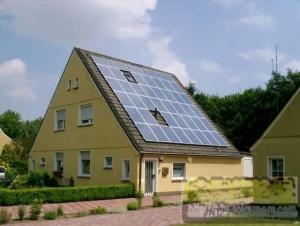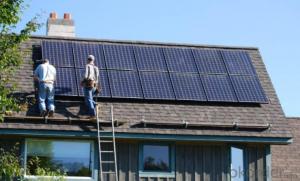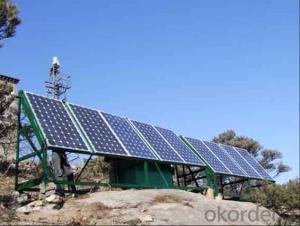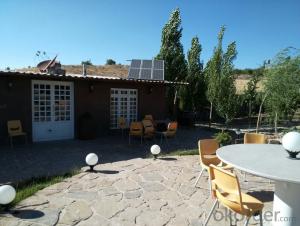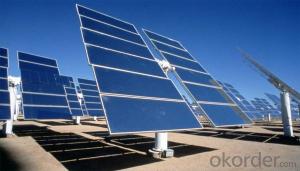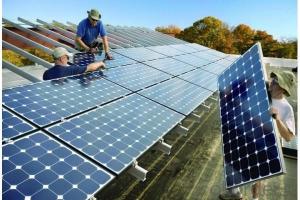Passive Solar Energy Systems - Off-Grid Solar Power System 500W High Efficiency
- Loading Port:
- China main port
- Payment Terms:
- TT OR LC
- Min Order Qty:
- 1 pc
- Supply Capability:
- 10000 pc/month
OKorder Service Pledge
OKorder Financial Service
You Might Also Like
1.Description of Product
Off-Grid Solar Power System is consisted of solar panel, solar charge controller, inverter, battery, mounting rack and cables.
(1).Grid-connected, send power to city grid
(2).MPPT technology, wide range of working voltage
(3).Simply Wiring, easy installation, customized design for your projects
(4).Low investment & long term feedback
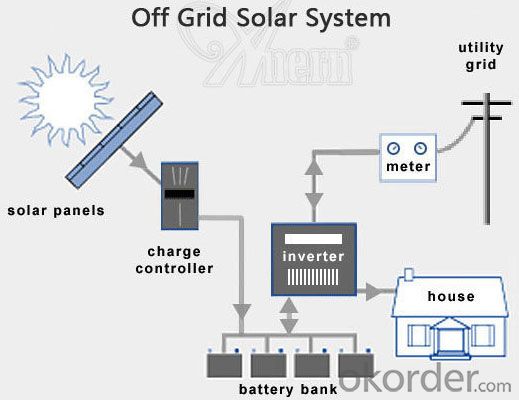
2. Off-Grid Features
1. Off grid solar power system is mainly used for application with relatively-small power consumption, and the areas have no grid network coverage, or grid power is unstable or outage condition.
2. It’s composed of solar panels, hybrid solar inverter, battery bank, solar panel mounting racks, and other accessories required fora complete home solar power system.
3. The battery bank gives a stable power output to the solar inverter which converts DC to AC to power loads, and provides power backup in rainy or cloudy days.
4. The solar panels generate electricity at daytime and charge the battery bank .
5. The off grid home solar power system provides grid power bypass in case of battery power shortage when sunshine is not enough.
6. All the off grid home solar power system configurations are worked out by scientific calculation and design.
The Product Parameter | |
Ref No. | 500W |
Solar Panel | Type: Monocrystalline Silicon PV Module Max Power: 250W QTY:2 pcs |
Controller-Inverter Integrator | Rated Ouput Power: 500W Rated DC Voltage: 24V QTY:1 pcs |
Battery | 12V/200AH per piece QTY:2 pcs |
Solar Panel Rack | Roof type mounting rack, anodized aluminum material, including complete fittings (Other type of racks can be customized as per client's requirement) QTY:1 pcs |
3.The Pictures of Product
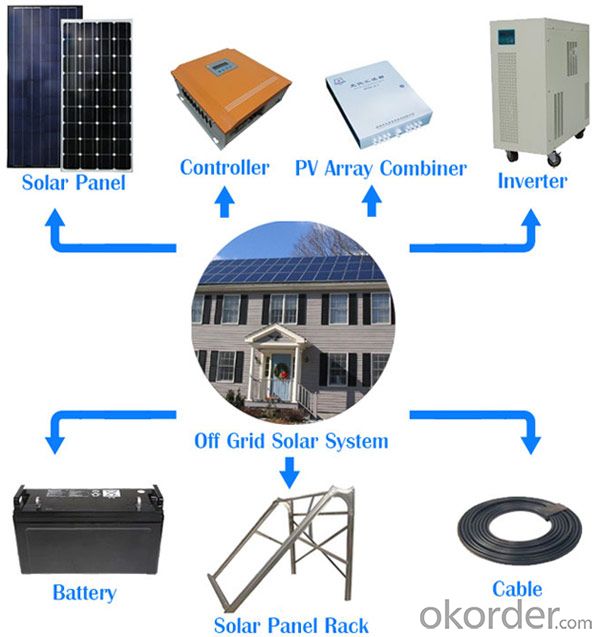
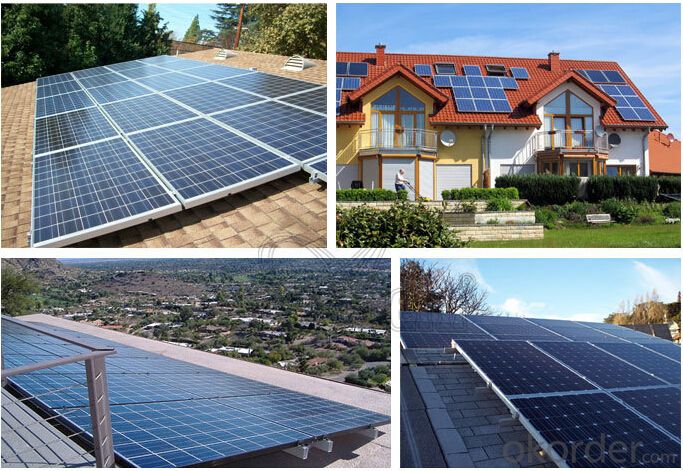
4.FAQ
Q1: What is the business type for the company?
A1: We are one of the biggest manufacturers inBejing.Chnia. Which is a high tech PV enterprise dedicated to the research, development, production and sales..
Q2: How long solar panel warranty can you offer?
A2: 10-Year product warranty,25-year linear power output warranty
If there is any quality problem, we will pay for freight and send free parts to you.
Q3: How many certificates do you have?
A3: We have 16 certificates,such as CE, TUV, UL, and so on.
Q4: Can I be the agent for you?
A4: Yes,We can discuss some information.
Q5: How to get a sample?How can cooperation with us
A5: contact us now.
- Q: How do solar energy systems contribute to reducing noise pollution compared to traditional power generation methods?
- Solar energy systems contribute to reducing noise pollution compared to traditional power generation methods because they do not require noisy machinery like generators or turbines to produce electricity. Instead, solar panels silently convert sunlight into energy, resulting in a much quieter and peaceful environment.
- Q: What are the components of a solar energy system?
- A solar energy system consists of several key components that work together to harness the power of the sun and convert it into usable electricity. The main components of a solar energy system include: 1. Solar Panels: These are the most recognizable element of a solar energy system. Solar panels, also known as photovoltaic (PV) panels, are made up of multiple solar cells that convert sunlight into direct current (DC) electricity. They are typically mounted on the roof or ground to capture sunlight. 2. Inverter: The DC electricity generated by the solar panels needs to be converted into alternating current (AC) electricity, which is the type of electricity used in homes and businesses. An inverter is responsible for this conversion process, ensuring that the electricity can be used by various appliances and devices. 3. Mounting System: Solar panels need to be securely mounted on rooftops or on the ground. The mounting system consists of racking or frames that hold the panels in place and allow for optimal sunlight exposure. The mounting system also ensures that the panels are installed at the correct angle and orientation to maximize energy production. 4. Electrical Wiring: Proper electrical wiring is crucial to connect the solar panels, inverter, and other components of the solar energy system. The wiring carries the electricity from the panels to the inverter, and then to the electrical panel of the building, where it can be distributed and used. 5. Batteries (Optional): In some solar energy systems, batteries are included to store excess electricity generated during the day for use during the night or during periods of low sunlight. These batteries store the excess energy and release it when needed, allowing for a more consistent and reliable power supply. 6. Monitoring System: Many solar energy systems come with a monitoring system that allows users to track the performance and energy production of their system. This can be done through a web-based platform or a smartphone app, providing real-time data on energy generation, consumption, and savings. 7. Grid Connection (Optional): Solar energy systems can be connected to the electrical grid, allowing excess electricity to be fed back into the grid when the system produces more energy than is being used. This is known as net metering, and it allows homeowners to earn credits or receive compensation for the excess energy they generate. Overall, a solar energy system is a complex and interconnected set of components that work together to harness the sun's energy and convert it into usable electricity for various applications. These components enable individuals and businesses to reduce their reliance on traditional fossil fuel-based energy sources and contribute to a cleaner and more sustainable future.
- Q: I want to install a full set of domestic solar heating equipment does not know how much money to spend, please.
- This area of solar heating system is divided into 4 parts: solar panels. Thermal energy water storage device. Thermal converter. Auxiliary heating wall. This system can be added with winter heating of buildings above 50% hot heat as a heat source for heating indoor floor heating systems, the spring and autumn three season can use gas or not using gas assisted heating (heat storage water tank can not increase the gas heating can be all-weather hot water).
- Q: Can solar energy systems be used for powering electric vehicle charging infrastructure?
- Yes, solar energy systems can be used to power electric vehicle charging infrastructure. Solar panels can be installed to generate electricity from the sun, which can then be used to charge electric vehicles. This renewable energy source is a sustainable and environmentally-friendly option for powering electric vehicle charging stations.
- Q: Can solar energy systems be used in powering hotels or resorts?
- Yes, solar energy systems can certainly be used to power hotels or resorts. Solar power is a clean and renewable energy source that can provide ample electricity to meet the energy demands of hotels and resorts. These establishments typically require a significant amount of energy for various purposes such as lighting, heating, cooling, and operating electrical appliances and equipment. Installing solar panels on the rooftops or in open areas of hotels and resorts can allow them to harness the abundant sunlight and convert it into electricity. This electricity can be used to power the entire facility, reducing the reliance on traditional energy sources and lowering the carbon footprint. In addition to being environmentally friendly, solar energy systems can also provide financial benefits to hotels and resorts. By generating their own electricity, these establishments can reduce or even eliminate their utility bills, resulting in substantial cost savings over time. Moreover, some countries offer incentives, grants, or tax credits for implementing solar power systems, further enhancing the economic viability of such installations. Furthermore, the availability of solar energy is not limited to sunny days. With advancements in technology, solar panels can still generate electricity even during cloudy or overcast conditions. Additionally, excess energy produced during peak sunlight hours can be stored in batteries for later use, ensuring a consistent power supply throughout the day and night. By adopting solar energy systems, hotels and resorts can showcase their commitment to sustainability and environmental responsibility. This can be a valuable marketing tool, attracting eco-conscious guests who prefer environmentally friendly accommodations. It also aligns with the growing trend of sustainable tourism, which can enhance the reputation and competitiveness of these establishments in the industry. Overall, solar energy systems are a viable and efficient solution for powering hotels and resorts. They offer numerous benefits, including reduced utility costs, environmental sustainability, and enhanced market appeal. As the technology continues to evolve and become more affordable, more and more hotels and resorts are embracing solar power as a clean and reliable energy source.
- Q: Can solar panels be installed on vertical surfaces?
- Yes, solar panels can be installed on vertical surfaces. While they are most commonly installed on rooftops or ground-mounted systems angled towards the sun, advancements in technology have made it possible to mount solar panels on vertical surfaces such as walls or fences. These vertical installations are known as building-integrated photovoltaics (BIPV) and can be an effective way to generate solar energy in areas with limited horizontal space.
- Q: Can a solar energy system be installed in an area with high pollution levels?
- Yes, a solar energy system can be installed in an area with high pollution levels. While pollution may reduce the system's efficiency to some extent by blocking sunlight, solar panels can still generate electricity under such conditions. Additionally, switching to solar energy can help combat pollution by reducing reliance on fossil fuels, thus contributing to a cleaner environment.
- Q: How do solar energy systems affect air pollution?
- Solar energy systems have a positive impact on air pollution as they generate clean and renewable energy without emitting harmful pollutants or greenhouse gases. By reducing the reliance on fossil fuels for electricity generation, solar energy helps to improve air quality and mitigate the negative health and environmental effects associated with air pollution.
- Q: Can solar energy systems be used for recreational vehicles or boats?
- Yes, solar energy systems can be used for both recreational vehicles and boats. These systems are commonly used to power various appliances, charge batteries, and provide electricity for lighting and other electrical needs while on the move. Solar panels can be easily installed on the roof or any other suitable surface of the vehicle or boat, allowing for sustainable and renewable energy generation.
- Q: Can solar energy systems be used in areas with frequent hurricanes?
- Yes, solar energy systems can be used in areas with frequent hurricanes. While it is true that hurricanes can cause damage to solar panels and other components of solar energy systems, there are measures that can be taken to mitigate these risks. Firstly, the design and installation of solar energy systems in hurricane-prone areas can be done to withstand high winds. This includes using stronger mounting systems, reinforced frames, and secure anchoring techniques. Additionally, the orientation and tilt angle of the panels can be optimized to minimize wind resistance. Furthermore, regular maintenance and inspections can help identify any potential issues or damage to the system before a hurricane hits. This allows for timely repairs or replacements, ensuring the system remains functional and safe during extreme weather events. In the event of a hurricane, it is important to have emergency procedures in place to secure the solar panels and other components. This can involve temporarily removing the panels and securing them indoors or utilizing protective covers to shield them from debris. Moreover, the use of microinverters or power optimizers in solar energy systems can enhance their resilience in hurricane-prone areas. These technologies allow each solar panel to operate independently, mitigating the impact of any damage to a single panel and preventing the entire system from shutting down. Lastly, solar energy systems can also contribute to the resilience of communities during and after hurricanes. With proper battery storage, solar systems can provide backup power during power outages, allowing essential services to continue operating and providing electricity for critical needs such as lighting, refrigeration, and medical equipment. Overall, while precautions need to be taken to ensure the durability and functionality of solar energy systems in hurricane-prone areas, they can be effectively used to harness clean and renewable energy even in the face of frequent hurricanes.
Send your message to us
Passive Solar Energy Systems - Off-Grid Solar Power System 500W High Efficiency
- Loading Port:
- China main port
- Payment Terms:
- TT OR LC
- Min Order Qty:
- 1 pc
- Supply Capability:
- 10000 pc/month
OKorder Service Pledge
OKorder Financial Service
Similar products
Hot products
Hot Searches
Related keywords
